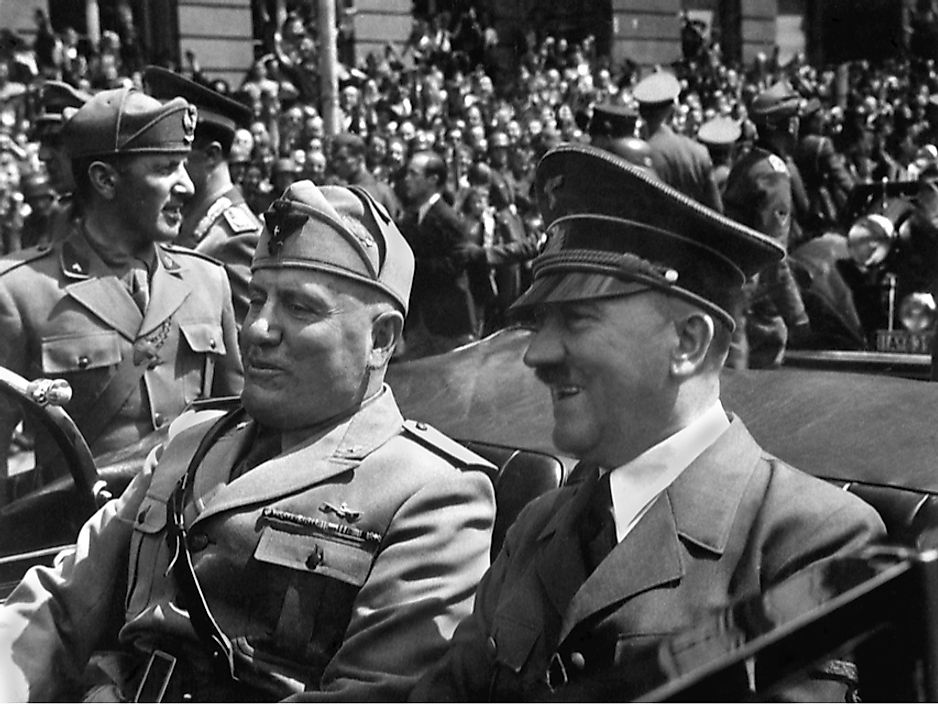Who Was Adolf Hitler?

Adolf Hitler is mainly associated with the atrocities of the Holocaust. He was a German politician who led the Nazi Party. Hitler also served as the Chancellor of Germany as well as the Führer (leader) of Nazi Germany. He was the dictator of German Reich, who started WWII in Europe when he invaded Poland in September 1939. Hitler is known as one of the worst dictators in history.
4. Early Life
Adolf Hitler was born to Alois Hitler and Klara Pölzl in Austria on April 20, 1889. Three of his siblings did not survive infancy. The Hitler family settled in Passau, Germany when Hitler was three and returned to Austria in 1894. The family relocated to Hafeld in 1895 where Hitler studied at Volksschule. Hitler and his father always had conflicts because he refused to conform to the school's strict discipline. Hitler's father sent him to the Realschule in Linz against Hitler's wishes to become an artist. Hitler had embraced German nationalism from a young age and spoke of loyalty only to Germany. After his father's death, Hitler transferred to the Realschule in Steyr but left in 1905.
3. Rise to Power
Starting in 1905, Hitler worked as a casual laborer and subsequently as a painter in Vienna. Hitler's works were turned down by the Academy of Fine Arts in Vienna in 1907 and 1908. In 1907, Hitler's mother died leaving him penniless and living in men's hostels and homeless shelters. During the period Hitler lived in Vienna, the city was rife with racism and religious prejudice. Hitler became exposed to such German nationalists as Georg Ritter Von Schönerer and philosophers such as Nietzsche, Darwin, and Schopenhauer. Historians continue to debate on when Hitler became an anti-Semite although he states he became an anti-Semite in Vienna in Mein Kampf.
He moved to Munich in 1913 after receiving the last installment of his father's estate, a move which historians claim was made to avoid joining the Austro-Hungarian Army. Hitler enlisted in the Bavarian Army at the onset of WWI where he was decorated for his service. He was admitted to a hospital in Beelitz and again in Pasewalk after a mustard gas attack left him temporarily blind. Hitler was significantly affected by German's defeat in the war. The Treaty of Versailles further implemented economic sanctions and demanded Germany pay heavy costs of damages. He, like other Germany nationalists, believed that the country had been betrayed by Marxists and other civilian leaders.
After the war, Hitler went back to Munich and continued to work for the army. After promotion to an intelligence officer, Hitler was assigned to monitor the German Worker's Party (DAP). He warmed up to the nationalist, anti-Marxist, anti-capitalist, and anti-Semitic ideas of Anton Drexler, who was the party's founder. Hitler subsequently joined the Party in 1919. DAP was renamed Nationalsozialistische Deutsche Arbeiterpartei (NSDAP), sometimes abbreviated as Nazi. He gained popularity for his speeches which were against Jews, the Treaty of Versailles, and Marxists. He was arrested for nine months after leading a failed coup, and in 1932, he became second in the presidential elections. As President, Paul von Hindenburg appointed Hitler as chancellor. Hitler worked his way towards establishing full control over the executive and legislative branches of government.
2. Hitler as a Politician
Hitler's expansion pursuits, first in Austria and Czechoslovakia, led his army into Poland and in effect triggered World War Two. The first phase of the war featured several victories for Germany, whose superior war tactics took down such powers as France and Belgium. However, Germany was defeated by the Allies and the Soviets. Historians suggest that Hitler suffered several health problems such as Parkinson's disease, syphilis, coronary sclerosis, and irritable bowel syndrome. The persecution of Jews and disabled people by the Nazis was heavily criticized. Although he had set out to rebuild and reassert Germany's position, WWII left the country in ruins and its people in despair.
1. Death and Legacy
In early 1945, Hitler began anticipating Germany's defeat. On April 29, Hitler wedded Eva Braun and dictated his will to Traudl Junge, his secretary. After he was told of Benito Mussolini's execution, Hitler shot himself while his new wife bit into a cyanide capsule. The bodies of the two were doused with petrol. Hitler is infamously remembered for the Holocaust, where an estimated six million Jews in Europe were killed.







